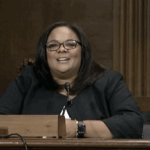
Variety’s headline — “E. Jean Carroll Hopes Her Explosive Telluride Doc Will ‘Finish Off’ Donald Trump” — speaks volumes, but not about Trump. It reveals, once again, how the anti-Trump industrial complex recycles the same tired tactics, banking on the idea that a new format — in this case, a documentary — will succeed where lawsuits, indictments, and breathless media coverage have already failed.
The E. Jean Carroll saga has always been the weakest link in the six major “lawfare” campaigns launched against Trump. Even stripped of politics, the story itself collapses under the weight of its contradictions. Carroll couldn’t remember whether the alleged assault happened in 1995 or 1996.
She told no one for decades, surfacing with the accusation only when promoting a book in 2019. Her narrative closely resembled a Law & Order: SVU episode — conveniently set in the lingerie section of Bergdorf Goodman — that aired years before her revelation.
Then there’s the “evidence.” Carroll claimed to have preserved the very dress she wore during the alleged encounter, unwashed, in her closet. Yet when Trump’s defense team requested to test it, Judge Lewis Kaplan blocked them. If her story had merit, why deny the most obvious avenue for confirmation? Instead, the courtroom became a carefully managed stage where inconvenient details — like her bizarre CNN interview about “rape fantasies,” or her history of provocative sexual commentary — were excluded.
The financing behind Carroll’s case underscores its political design. Anti-Trump billionaire Reid Hoffman bankrolled the effort through a nonprofit. George Conway, the Trump-obsessed pundit, urged Carroll toward civil litigation and cheered from the sidelines. And Roberta Kaplan, a #MeToo power attorney, ensured the trial became less about facts and more about symbolism.
Trump, married to Marla Maples at the time and a fixture in New York’s high society, allegedly risked everything to assault a woman in her 50s in a public department store. No witnesses. No outcry. No surveillance. Half penetration, maybe? Carroll herself could never settle on what exactly happened — or whether she wanted to call it rape. The entire account strains credulity.
Yet thanks to a sympathetic judge and a Manhattan jury pool hostile to Trump, the case produced a civil judgment. But it never moved the electoral needle. Trump’s support remained intact, proving what his critics refuse to admit: the public is far less convinced by these orchestrated spectacles than the media echo chamber is.
Now, the same cast of characters is betting that a Telluride documentary will achieve what their courtroom drama did not. Carroll herself calls it an attempt to “finish off” Trump. That phrase gives the game away. This isn’t about truth or justice. It’s about narrative warfare — dressing up shaky allegations as cinematic “fact” in the hope of swaying voters.
But voters have seen this script before. Russiagate. Impeachment. January 6th hearings. Fulton County. Carroll’s courtroom battle. Each time, Trump’s enemies promised this would be the end. Each time, it wasn’t.








